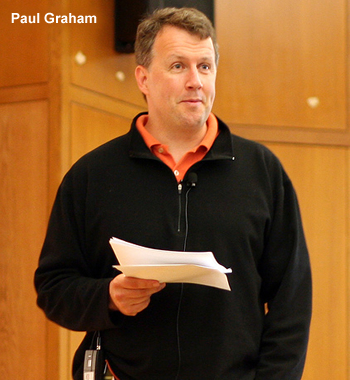Social Media: November 2010 Archives
Does this mean an ad will cost $40 million dollars per spot?
 So, I was just on Facebook - along with 500+ million of my friends (soon to be be 7.3 billion) - and couldn't help notice the sidebar banner ad pitch to "Advertise On Facebook" (see left).
So, I was just on Facebook - along with 500+ million of my friends (soon to be be 7.3 billion) - and couldn't help notice the sidebar banner ad pitch to "Advertise On Facebook" (see left).
Now, I've never noticed an ad on Facebook. Not one. And I don't think I'm alone.
So why would I pay anything to advertise on Facebook? Because you can't afford NOT to have your product or brand in front of 500 MILLION POTENTIAL CUSTOMERS. Right?
Because fear works when you're pitching your platform to advertising agencies - "You need us more than we need you." So it's better to make an expensive ad buy on Facebook, even though no one will see your ad, than to be left behind.
Do they think we're idiots? At least on television, even if the ad is being skipped in fast motion, you see the product. On Facebook, you don't even notice the ad and, if you did, you wouldn't care because you don't want to see advertising when you're on Facebook.
The only ad tactic that seems to work on Facebook is the one where hot young girls (old dudes pretending to be hot young girls) to "Friend" guys and then post non-stop about how they "LOVE THEIR NEW NISSAN SENTRA" and how much "The New Coke Zero ROX!"
Let I said before, Facebook, unless they start to charge user fees or do those horribly annoying ads that pop right in your face when you log in, is on the road to becoming worthless.
 Jill Kennedy - OnMedea
Jill Kennedy - OnMedea
 So, I was just on Facebook - along with 500+ million of my friends (soon to be be 7.3 billion) - and couldn't help notice the sidebar banner ad pitch to "Advertise On Facebook" (see left).
So, I was just on Facebook - along with 500+ million of my friends (soon to be be 7.3 billion) - and couldn't help notice the sidebar banner ad pitch to "Advertise On Facebook" (see left). Now, I've never noticed an ad on Facebook. Not one. And I don't think I'm alone.
So why would I pay anything to advertise on Facebook? Because you can't afford NOT to have your product or brand in front of 500 MILLION POTENTIAL CUSTOMERS. Right?
Because fear works when you're pitching your platform to advertising agencies - "You need us more than we need you." So it's better to make an expensive ad buy on Facebook, even though no one will see your ad, than to be left behind.
Do they think we're idiots? At least on television, even if the ad is being skipped in fast motion, you see the product. On Facebook, you don't even notice the ad and, if you did, you wouldn't care because you don't want to see advertising when you're on Facebook.
The only ad tactic that seems to work on Facebook is the one where hot young girls (old dudes pretending to be hot young girls) to "Friend" guys and then post non-stop about how they "LOVE THEIR NEW NISSAN SENTRA" and how much "The New Coke Zero ROX!"
Let I said before, Facebook, unless they start to charge user fees or do those horribly annoying ads that pop right in your face when you log in, is on the road to becoming worthless.
 Jill Kennedy - OnMedea
Jill Kennedy - OnMedea
There... that should guarantee about 10,000 hits on this entry. I originally wanted to call it "Y Combinator Is A Bullshit Idea"
(which would have guaranteed about 20,000 hits) but the ads on the side
wouldn't have displayed due to the "bullshit" in the title.
So, I just read the Christopher Steiner article "The Disruptor In The Valley" at Forbes.com (which is about Paul Graham and his company Y Combinator) and my immediate thought was of that exchange from "The Simpsons" (Season 12 - Episode 9) when Homer is undergoing medical experiments for money. He tries an appetite suppressant:
 HOMER: "I'm BLIND!"
HOMER: "I'm BLIND!"
SCIENTIST #1: "Who's gonna buy a pill that makes you blind?"
SCIENTIST #2: "We'll let marketing worry about that!"
Y Combinator is basically offering Silicon Valley a pill that makes them blind (but marketing will fix it).
They offer a little bit cash to grab a whole lot of equity in all these tiny start-ups - most which are not even close to being ready for that kind of exposure (or financial decision).
However, with the right spin, PR and influence behind them, they (apparently) ARE ready for the additional money that others might throw their way (for another giant chunk of equity)... if they can manage to get through the summer YC bootcamp.
It's like the YouTube star who gets a shot on "The Big Bang Theory" and can barely speak because they're so nervous and then find out they have no acting skills whatsoever.
This is not to say that there aren't a whole lot of geniuses out there with a lot of great ideas. There are. Most are smarter than me (but not as smart as Khan Manka, Jr.).
But these geniuses (and mostly non-geniuses, let's be serious) are being exploited by Paul Graham and company and tossed to these VC wolves who will eat through many a carcass to get to the next Facebook (which I think is Worthless, by the way).
(Also Digg is dead - R.I.P. - so is Electus and Comic-Con but I digress....)
But much like the screenwriter in Los Angeles who will pay people to read their script because they "work at a studio", the chances of success in one of these cattle call models is virtually zero.
 As a quick primer, allow me a paragraph (from Wikipedia) to explain Y Combinator to those who may not know what it is:
As a quick primer, allow me a paragraph (from Wikipedia) to explain Y Combinator to those who may not know what it is:
 In other words, throw a bunch of shit on the wall and see what sticks.
In other words, throw a bunch of shit on the wall and see what sticks.
Great for Paul Graham and company, I suppose (based on his theory, Y Combinator would have gotten $20,000 from Y Combinator), but terrible for almost all of those thousands who apply to his program every year just in the hope of getting the YC stamp of approval (and 60 lbs of chili) - which supposedly means a lot to VCs and Angel Investors in Silicon Valley.
So Y Combinator is a Venture Capitalist that funds your start-up so that your start-up can get funded by another Venture Capitalist.
Enough with these f-ing VCs, man.
Whatever happened to creating a company, becoming successful and growing it based on that initial success. Success because you have a product that people really (REALLY) want.
Thousands of techies are just sitting around coffee shops and cafes in all the "Silicon Valleys of the world" trying to think up new ideas that Paul Graham (and others like him) might like. Not because it's an idea that the start-up founder actually believes in anymore - but because it's one that might get funding.
I mean, fuck passion, right? These days it's not whether your company succeeds or fails, it's whether it gets funded in the first place and a mention on TechCrunch.
 Jill Kennedy - OnMedea
Jill Kennedy - OnMedea
So, I just read the Christopher Steiner article "The Disruptor In The Valley" at Forbes.com (which is about Paul Graham and his company Y Combinator) and my immediate thought was of that exchange from "The Simpsons" (Season 12 - Episode 9) when Homer is undergoing medical experiments for money. He tries an appetite suppressant:
 HOMER: "I'm BLIND!"
HOMER: "I'm BLIND!"SCIENTIST #1: "Who's gonna buy a pill that makes you blind?"
SCIENTIST #2: "We'll let marketing worry about that!"
Y Combinator is basically offering Silicon Valley a pill that makes them blind (but marketing will fix it).
They offer a little bit cash to grab a whole lot of equity in all these tiny start-ups - most which are not even close to being ready for that kind of exposure (or financial decision).
However, with the right spin, PR and influence behind them, they (apparently) ARE ready for the additional money that others might throw their way (for another giant chunk of equity)... if they can manage to get through the summer YC bootcamp.
It's like the YouTube star who gets a shot on "The Big Bang Theory" and can barely speak because they're so nervous and then find out they have no acting skills whatsoever.
This is not to say that there aren't a whole lot of geniuses out there with a lot of great ideas. There are. Most are smarter than me (but not as smart as Khan Manka, Jr.).
But these geniuses (and mostly non-geniuses, let's be serious) are being exploited by Paul Graham and company and tossed to these VC wolves who will eat through many a carcass to get to the next Facebook (which I think is Worthless, by the way).
(Also Digg is dead - R.I.P. - so is Electus and Comic-Con but I digress....)
But much like the screenwriter in Los Angeles who will pay people to read their script because they "work at a studio", the chances of success in one of these cattle call models is virtually zero.
 As a quick primer, allow me a paragraph (from Wikipedia) to explain Y Combinator to those who may not know what it is:
As a quick primer, allow me a paragraph (from Wikipedia) to explain Y Combinator to those who may not know what it is:Y Combinator is an American seed-stage startup funding firm, started in 2005 by Paul Graham, Robert Morris, Trevor Blackwell, and Jessica Livingston. Y Combinator provides seed money, advice, and connections at 3-month programs. In exchange, they take an average of about 6% of the company's equity.
Compared to other startup funds, Y Combinator provides very little money ($17,000 for startups with two founders and $20,000 for those of three or more). This reflects Graham's theory that between free software, dynamic languages, the web, and Moore's Law, the cost of founding a startup has greatly decreased.
 In other words, throw a bunch of shit on the wall and see what sticks.
In other words, throw a bunch of shit on the wall and see what sticks. Great for Paul Graham and company, I suppose (based on his theory, Y Combinator would have gotten $20,000 from Y Combinator), but terrible for almost all of those thousands who apply to his program every year just in the hope of getting the YC stamp of approval (and 60 lbs of chili) - which supposedly means a lot to VCs and Angel Investors in Silicon Valley.
So Y Combinator is a Venture Capitalist that funds your start-up so that your start-up can get funded by another Venture Capitalist.
Enough with these f-ing VCs, man.
Whatever happened to creating a company, becoming successful and growing it based on that initial success. Success because you have a product that people really (REALLY) want.
Thousands of techies are just sitting around coffee shops and cafes in all the "Silicon Valleys of the world" trying to think up new ideas that Paul Graham (and others like him) might like. Not because it's an idea that the start-up founder actually believes in anymore - but because it's one that might get funding.
I mean, fuck passion, right? These days it's not whether your company succeeds or fails, it's whether it gets funded in the first place and a mention on TechCrunch.
 Jill Kennedy - OnMedea
Jill Kennedy - OnMedea 
About Jill Kennedy
Manka Bros. (and the Manka Business Channel) hired her (for a very low sum) to cover the world of media (not the world of Medea) in her own words without corporate interference.
About Medea
She was a sorceress and wife of Jason, whom she assisted in obtaining the Golden Fleece. When Jason deserted her, she chopped up their children. One could say, Medea acted as rationally as a major media company.
Recent Posts
Recent Comments
Infomercial Company on Say It Ain't So, Tony DiSanto: Hi Jill W
Hollywood Producer on CBS Films - R.I.P. - Beastly Update: I think Be
Jill Kennedy on The Trouble With Groupon: Thanks, Sa
sam on The Trouble With Groupon: Excellentl
santos loquasto on Not ANOTHER Fairy Tale Ending: See, the p
Jill Kennedy on The Trouble With Groupon: Hey BC Clo
Jammin Good on Advertise On Facebook - Reach More People Than 10 Super Bowls!: The worse,
BC Cloutier on The Trouble With Groupon: Oh, really
Joe on Advertise On Facebook - Reach More People Than 10 Super Bowls!: Fred, that
Archives
Search
[What is this?]
Categories
Tips, Scoops and Smoking Guns